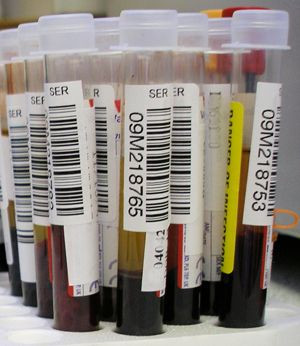Researchers Find Genetic 'Barcode' That Indicates Aggressive Prostate Cancer

Two studies have found that the grimmest prostate cancers can be identified through the use of a genetic scanner, almost like a barcode. The studies show that reliable blood tests, along with the Prostate-Specific Antigen test (PSA), can help patients with the worst prognosis seek immediate treatment. It also shows that prostate cancer's traces in the blood can help doctors and researchers better understand the illness.
Prostate cancer is a very heterogeneous disease in both its symptoms and evolution. Some patients can live for years without displaying symptoms, while in other patients, the tumor can be swift and deadly. Blood tests can help doctors identify the worst of the bunch.
In one study published in Lancet Oncology, doctors from Spain and the United Kingdom scanned the genes of 100 patients' blood samples. All of these patients had prostate cancer. Of the total group, 31 were found to have a low-risk, localized tumor; 69 were found to have advanced-stage prostate cancer.
The researchers divided the remaining 69 participants into four groups that reflected trends in their genetic "barcodes." They then continued to track the study participants for about two and a half years. In one particular group, researchers found that participants had a considerably lower survival rate - 9 months compared to almost two years (21 months). Researchers found that all of these patients in the fourth group had alterations in the activity of only nine genes. Their immune systems also behaved differently than their peers, indicating that tumor cells had changed the functioning of their immune systems as the cells ravaged the patients' bodies.
A second, similar study published by researchers in the United States found that only six genes predicted a more aggressive form of prostate cancer. Patients with that genetic signature survived on average for less than 8 months, while patients without the genetic signature lived for nearly three years (nearly 35 months). That study was also published in the Lancet Oncology.
The grimmest prognosis is currently for those with castration-resistant prostate cancer. Men with this cancer have the misfortune of possessing a tumor that is resistant to even the most drastic weapons that doctors have in their arsenal, including the lowering of testosterone levels as well as surgery. Normally, the decrease in testosterone levels would stop the tumor's growth, but in this form of cancer, the tumor cells continue to grow and spread.
While this news may seem depressing, researchers think that it is, in fact, good news. A blood test would be much simpler than another biopsy, for example, and not having to undergo a biopsy would mean eliminating the side effects associated with the procedure.
Published by Medicaldaily.com



























